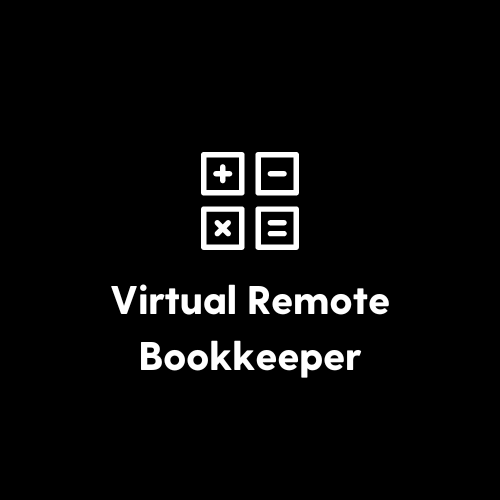
As a small business owner, staying on top of your financial records is crucial for long-term success. Yet, with countless daily tasks demanding your attention, bookkeeping often takes a backseat until tax season looms. Enter remote bookkeeping, an innovative solution that not only saves time and money but also ensures your business remains tax-ready throughout the year.
In this blog, we’ll explore how remote bookkeeping can revolutionize your business operations, streamline tax preparation, and enhance financial efficiency.
What Is Remote Bookkeeping?
Remote bookkeeping involves hiring professional bookkeepers who work virtually to manage your financial records. Instead of having an in-house accountant or dedicating your own time to managing books, a remote bookkeeping service ensures your finances are handled professionally. Services like Virtual Remote Bookkeeper specialize in offering tailored solutions for small businesses, using tools like Zoho Bookkeeping to make financial management seamless.
1. Why Bookkeeping Is Crucial for Small Businesses
Effective bookkeeping forms the backbone of a successful business. It involves tracking income, expenses, and maintaining organized financial records, which helps businesses:
- Monitor cash flow.
- Identify profit-making opportunities.
- Prepare accurate tax returns.
- Avoid financial discrepancies or penalties.
Small businesses often struggle with bookkeeping due to limited resources or expertise. This is where remote bookkeeping services prove invaluable.
2. Advantages of Remote Bookkeeping for Small Businesses
Remote bookkeeping offers several benefits that empower small businesses to stay on top of their finances year-round.
a. Cost-Efficiency
Hiring an in-house bookkeeper can be expensive due to salaries, benefits, and office space. Remote bookkeeping eliminates these overhead costs, offering affordable solutions tailored to your business size.
b. Access to Expertise
Remote bookkeeping services like Virtual Remote Bookkeeper provide access to a team of experts who stay updated on tax laws, accounting practices, and software tools. This ensures your financial records are accurate and compliant.
c. Real-Time Financial Tracking
With cloud-based tools, remote bookkeeping offers real-time access to your financial data. This ensures you can monitor cash flow, expenses, and accounts payable or receivable from anywhere.
d. Error Reduction
Professionals are skilled at minimizing errors that can lead to tax issues or financial losses. Advanced tools like Zoho Books further automate processes, reducing human error.
e. Focus on Core Business Activities
By delegating bookkeeping tasks to a remote service, you can concentrate on growing your business, customer relationships, and strategic planning instead of crunching numbers.
3. How Remote Bookkeeping Keeps You Tax-Ready
Tax season can be stressful for small business owners, especially if financial records are unorganized. Remote bookkeeping ensures tax readiness with:

a. Accurate Recordkeeping
Remote bookkeepers maintain up-to-date records of your income, expenses, and other transactions, ensuring that you have all necessary documentation for tax filing.
b. Quarterly Tax Planning
Regular tracking of financial data helps bookkeepers project quarterly tax payments accurately, avoiding penalties and surprises during tax season.
c. Expense Categorization
Properly categorizing expenses is essential for maximizing tax deductions. Remote bookkeepers classify your expenses appropriately, ensuring you don’t miss out on potential savings.
d. Audit Preparation
Remote bookkeeping services help prepare your records in an audit-friendly format, reducing stress and ensuring compliance with tax authorities.
e. Compliance with Tax Laws
Tax regulations change frequently, and keeping up can be challenging. Remote bookkeepers stay informed about the latest tax laws, ensuring your business complies with all requirements.
4. Tools and Technology Used in Remote Bookkeeping
Modern remote bookkeeping relies on cutting-edge technology to deliver efficient services. Common tools include:
- Cloud-Based Accounting Software: Tools like Zoho Books enable seamless tracking of income, expenses, and invoices. Learn more about how Zoho Bookkeeping enhances financial management for small businesses.
- Document Management Systems: Securely store and manage receipts, invoices, and financial documents in the cloud.
- Payroll Management Tools: Automate employee payroll processing and tax calculations.
- Financial Reporting Dashboards: Gain insights into business performance with detailed analytics and reports.
5. Remote Bookkeeping and Small Business Growth
Remote bookkeeping does more than keep you tax-ready—it also drives growth by offering insights into your financial health. By analyzing trends, cash flow patterns, and profitability, bookkeepers help you make informed decisions, allocate resources effectively, and identify new growth opportunities.
a. Improved Cash Flow Management
Remote bookkeeping ensures you always know how much money is coming in and going out, enabling better cash flow management.
b. Financial Forecasting
With accurate financial data, remote bookkeepers can assist in forecasting future trends, helping you prepare for seasonal variations or business expansion.
c. Budgeting Support
A remote bookkeeper can help you create realistic budgets that align with your goals, ensuring that you stay within financial limits while pursuing growth opportunities.
6. Steps to Get Started with Remote Bookkeeping
Ready to take the leap? Follow these steps to implement remote bookkeeping for your small business:
a. Evaluate Your Needs
Identify the specific bookkeeping tasks you need help with, such as payroll management, tax preparation, or expense tracking.
b. Choose a Reliable Service
Select a reputable remote bookkeeping service like Virtual Remote Bookkeeper. Look for features like customizable solutions, cloud-based tools, and dedicated support.
c. Integrate Tools
Work with your bookkeeper to integrate accounting tools and streamline your financial processes.
d. Regular Communication
Stay in touch with your remote bookkeeper to review financial reports, address questions, and plan for tax season.
Conclusion
For small businesses, staying tax-ready is no longer a seasonal challenge but a year-round necessity. Remote bookkeeping services like Virtual Remote Bookkeeper simplify financial management, offering cost-effective solutions, access to expertise, and real-time insights.
Whether it’s categorizing expenses, preparing for audits, or ensuring compliance with tax laws, remote bookkeeping keeps your business financially healthy and ready for growth. Don’t wait until the next tax season to organize your finances—embrace remote bookkeeping today and focus on what you do best: running your business.
To learn more about how remote bookkeeping can transform your business, visit our blog or contact us for a personalized consultation.


